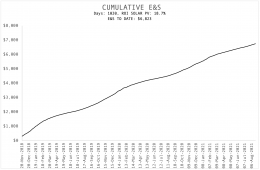Im OFF Grid so grid to me is moot.
I get an EV and charge it at home with my own solar power, I'm not paying for fuel anymore and that saving is "banked". Any "Car Payment" is irrelevant as you have that with any new vehicle (usually). Instead of pumping $250 a month into a Big Oil Co that's 250 saved to bank account and I would consider that payback from my solar. With a 200mile + EV and plug in charge at home, any external charging would be minimal if at all (long trips only). Average driver drives <50 miles a day commute +.
What he's arguing, and which I follow to an extent, is that you can also charge the EV from the grid and that that should be the comparison (solar vs grid) ad not EV vs ICE.
Convince me.
For that you'll need to demonstrate that earnings or savings resulting from installing solar PV cannot also be attained via other means, e.g. by using grid power.
If someone has or develops the know-how to build a PV system, and can do consulting in the field because of that, these result in earnings you can not necessarily get through other means unless you want to argue that any and all jobs/careers/positions/opportunities are available to everyone and anyone. For example, yes, I could get earnings by becoming the president of the US and this would be more money than can be made consulting - but that path just isn't an option (I'm not even American).
This is the same as if you would state that earnings and savings from a degree in engineering can be attained by other means - which while true at face value, is not the reality: not everyone can become a CEO, and not everyone can become an engineer in the first place.
Bringing this back to the scope of solar vs grid, perhaps with an analogy: if you sell a man a fish, he will eat for a day. If you teach a man to fish, he will develop the opportunity to start a fish and chips business. People often talk about opportunity cost, I quote:
"The opportunity cost of an activity or option is the loss of value or benefit that would be incurred (the cost) by engaging in that activity or choosing that option, versus/relative to engaging in the alternative activity or choosing the alternative option that would offer the highest return in value or benefit."
My personal opinion is that if you can charge and EV from the grid, v.s. charging (part of) the EV power from a solar system, the latter will present opportunities that would otherwise not be available. Whether you act on those opportunities and turn them into earnings is up to the individual, but I argue that these can lead to earnings not attainable by just using grid power.




